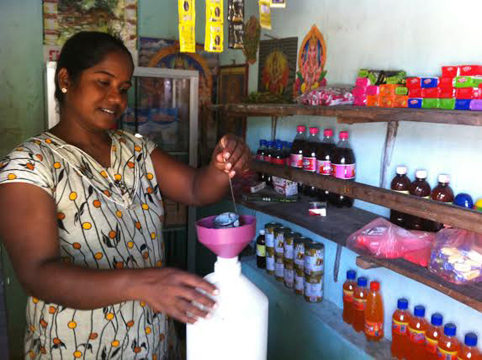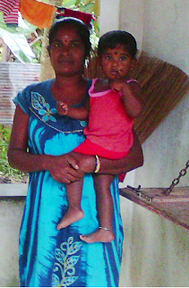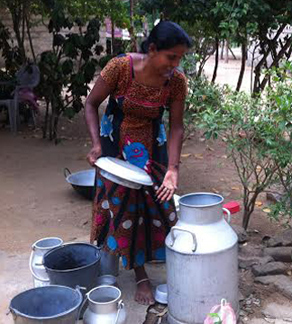Women on their own
Thrust into the role of breadwinners, women in the
East are proving to be good entrepreneurs, with a little help from
friends:
By A Staff Writer
Vijitha is 38 and lives with her three children in Vavunativu,
Batticaloa. In 2007, her husband was killed by a group of unknown men.
She never saw his body. But she knows he is dead.
|

Vijitha |
“When the villagers told me my husband had been killed, I too felt my
life had ended. But looking at the faces of my children, gave me the
courage to live on”.
Vijitha had never worked in her life before her husband’s death. But
at the time, she had two young daughters, aged 13 and 9 and a toddler
son, who had just turned three years, to educate and bring up. Her
choices were stark.
“At the beginning, I worked as a labourer in fields in the
surrounding areas. Eventually some NGO’s helped me to set up a small
grocery shop. Early this year, I was able to expand it”.
Vijitha’s average income from the sales in her shop is about 1500
rupees a day. Every month, after meeting her household expenses, she
saves about 3,500 rupees.
“I lost all hope of living when my husband died. But now I am
confident of a place in the community I Iive in. What I want most in
life is to educate my children, because I don’t want their lives to be
like mine”. Vijitha’s predicament is not unique. Every year, thousands
of women all over the world find themselves catapulted into the role of
a bread winner after their menfolk die, go missing or become disabled
during a conflict. Women bear the brunt of war, ill-equipped to cope
with the economic, societal and health challenges they will invariably
have to face as they learn to move on with life.
Single mother
Not far away from where Vijitha lives is Pallavarajini, 35,who is
also a single mother. She is bringing up her two sons who are 13 and 15
years old after her husband went missing. Her ageing father too lives
with her.
|

Uthayamalar |
“In 2007, we were displaced in Thimilativu, Batticaloa. One day, my
husband went to worship at the nearby kovil and never returned. I have
been looking for him ever since but to date I have no answers about his
whereabouts. I spent all my savings searching for him. All these years,
I had hope of finding him but this year, I gave up”.
Pallavarajini didn’t think she will make it as a single parent in the
community she lives in.
“They kept putting me down. Because they didn’t look on me favourably,
I didn’t have their support to get ahead. But after organizations, which
came to the area started programs with women headed households, people
came to understand our needs and the stress we have to endure. They
started to hear us”.
Today, Pallavarajini has overcome the odds and runs a successful milk
collection point. Her ambition is to be a role model to motivate other
women who run their households.
“I formed a livestock development society which has close to 20
members. They sell me the milk their cattle produce and I sell it on to
an agent. I sell about 85-100 litres of milk every day to the agent and
earn on average, about 700 rupees a day”.
What promoted Pallavarajini to form the society was the low price the
agent was paying them for the milk they supplied.
“The agent was paying us only 40 rupees for a litre of milk but I pay
society members 58 rupees for a litre. This is 18 rupees more than what
they used to get for a liter of milk selling directly to the agent. When
I sell the milk to the agent, I do it at the market price of 60 rupees a
litre. Everyone gets a better deal.
Livelihood support program
“The profit Pallavarajani earns is small but she supplements this by
selling to the agent, about 8 liters of milk from her herd of seven
cows.
|

Rajani |
“Her focus now, like that of Vijitha, is to educate her two boys.
“Everything I earn is for them”.
Uthayamalar 42, had to start looking after her family after her
husband Pushparajasingham lost his two arms to the conflict. She runs a
grocery shop in Vavunativu and earns about 2000 rupees a day.
“My husband helps me to run the shop but he can’t make any tangible
financial contribution to the household finances. So it’s all in my
hands, includinghaving to look after our daughter, who is five years
old, she explains as a matter of fact.
Vijitha, Pallavarajani and Uthayamalar are beneficiaries of the
livelihood support program the International Committee of the Red Cross
(ICRC) in Sri Lanka has for vulnerable people in the former conflict
affected areas. Under it, households headed by women, persons disabled
from the conflict and released rehabilitees receive a cash grant to
start or consolidate a livelihood activity which will generate a
sustainable income for them and their families. The program was piloted
in 2011, in the Vavuniya district, and its success led to its launch the
following year in the Kilinochchi and Mullaitivu districts. Between 2011
and 2014, 1770 households benefitted from the program.
At the beginning of 2015, the program was expanded to the Batticaloa
District where it is expected to reach 200 women headed households in
Koralaipattu South and Manmunai West divisional secretariat divisions. |

